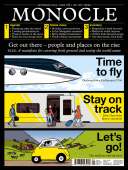
Issue 166
Ready to go? Great. Because Monocle’s September issue is all about getting out there, covering fresh ground and seeing the world anew. We survey the world of transport, from the leading presidential jets and futuristic sea gliders to Europe’s bike-building capital and the appeal of the mini Microlino. Plus: Mongolia’s geopolitical balancing act, Fendi’s artisanal investment and America’s poet laureate.
In This Issue
Oops! No content was found.
Looks like we no longer have content for the page you're on. Perhaps try a search?
Return Home

